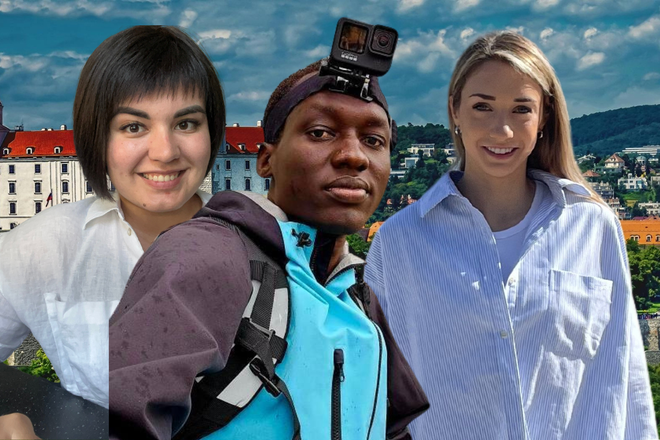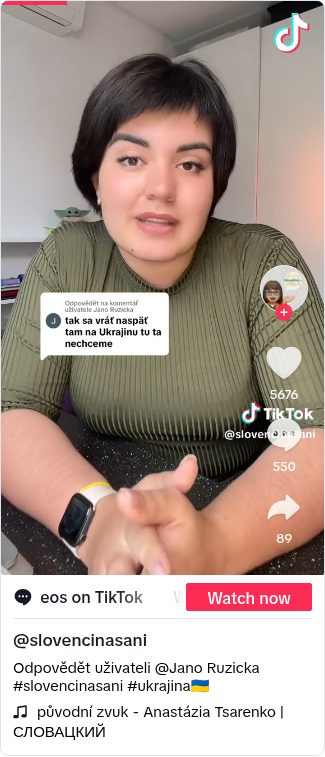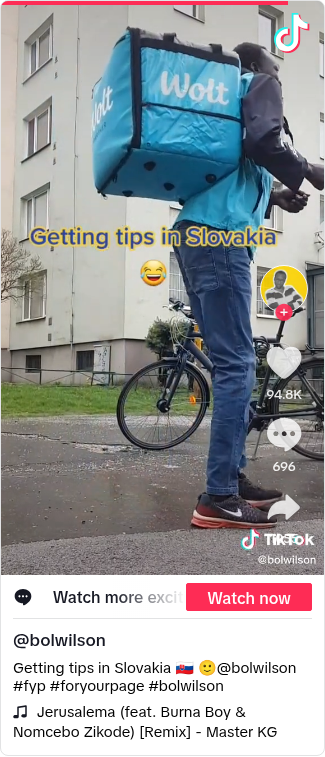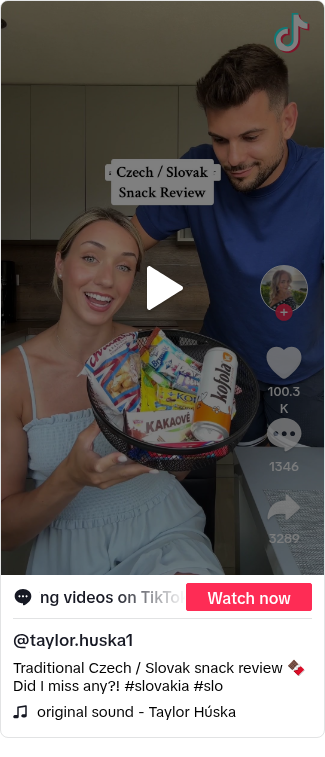Anastasia Tsarenko arrived in Slovakia from Kazakhstan eight years ago to study management in Bratislava. Wilson Bol gained fame on social media as “that Black guy who delivers for Bolt Food in Košice.” Taylor Húska, on the other hand, enjoys discussing cultural differences between the United States and Slovakia on social media.
What connects them is that they have found a family or a home in Slovakia. They like the country, are learning the language, and share their experiences and impressions of Slovakia online.
According to statistics from the Interior Ministry, 278,595 foreigners held residence permits in Slovakia in 2022. Despite this, Slovakia has the third-lowest proportion of foreigners among EU countries, with most coming from neighbouring states.
How do Tsarenko, Bol, and Húska experience life in Slovakia? What local reactions have they encountered, and what do they like – and dislike – about living here?
Online, they are brave – but no one insults me to my face
Before Anastasia Tsarenko began her studies, she spent a year at a language school, where she learned Slovak. Today, she speaks so fluently that you would never guess Slovak is not her first language. She now teaches it to Russian speakers.
“I think I do well because I’ve been through it myself. Slovaks don’t always know how to explain why certain things work in the language – it’s just natural to them,” she says with a smile.
She often talks about her journey of learning Slovak on TikTok. But it is there, in the comments, where she frequently encounters hate speech. People tell her to go home, insult her because of Russia, or simply because she is a foreigner.
“Every other person on the internet is brave, but no one has ever said anything like that to my face. At first, it got to me, but now I don’t let it bother me. I also have a lot of support from my husband, so I don’t face it alone," she says. Tsarenko is married to a Slovak and now considers Slovakia her (second) home.
She comes from Kazakhstan – her mother is Ukrainian, and her father is Russian, born in Kazakhstan. Visually, she does not stand out as a foreigner, which she believes helped her in the early years. She once had a Kazakh roommate with distinctly different eyes, who experienced derogatory behaviour from locals.
Tsarenko says she only faced poor treatment at the start of university, when classmates assumed she was unintelligent because she spoke Slovak very slowly. Once she caught up linguistically, their attitude changed. She never received an apology.
She believes people have always appreciated her efforts to speak Slovak, and she encountered kindness at government offices and the Foreigners’ Police. However, she has also heard some amusing myths about Kazakhstan.
“The first thing people usually ask is whether we have houses or if we live in yurts. Once, someone even asked if we have meat. I just laugh it off now. Borat probably did the worst PR for us – nothing in that film is even remotely true.”
She arrived in Slovakia as a young 16-year-old girl without any expectations. She says that she was not aware of any stereotypes and knew nothing about the country. “I was surprised when I arrived to Bratislava – I had imagined it based on other European capitals. Compared to those, the city centre seemed much smaller.”
At home, she always heard that life in the West was better, and she says she genuinely appreciates many things here. Among them, she highlights politeness, the ability to solve everyday issues without bribery, and Slovakia’s beautiful mountains.
“Of course, I came here, so it’s my responsibility to learn the language and culture. But I wish people would realise how much effort foreigners make,” she says.
“You shouldn’t judge a person by their language skills or appearance – give them a chance instead. In their own language, they might be a genius; they just haven’t learned to express themselves in the new one yet,” she concludes.
Encountering racism
Wilson Bol’s often humorous videos capture the reality of delivery workers, and he responds with wit even to comments that are openly racist.
It is not uncommon to see remarks in the comments suggesting that he stole the bike he delivers on or, in the usual fashion, that he should “go back home.”
“Hate comments rarely get to me. They come from strangers—I don’t know them, and I don’t care about their opinions. But sometimes, it does bother me, especially when the hate is more intense. Words can quickly turn into actions,” he says.
He notes that in the nine years he has lived in Slovakia, the situation has noticeably improved, and people are more open-minded than before. Originally from South Sudan, he first came to Slovakia as a student and, like Tsarenko, started out in a language school learning Slovak.
He says that most people treat him with respect, and he has had very few negative experiences, even when dealing with bureaucracy.
“As a courier and content creator on social media, I do sometimes encounter coldness or negative attitudes. But I must say, I also meet many genuinely good people who are willing to help.”
“At the Foreigners’ Police, though, I feel they’re quite impatient with me and not very willing to assist. If I need to ask something, they avoid me, always seem to be in a hurry, and of course, I have to speak Slovak with them.”
On the other hand, customers often automatically speak to him in English, even when he greets them in Slovak.
He is currently studying computer science at the Technical University in Košice, and his Slovak is at an intermediate level, with an accent.
“I feel safe in Slovakia, and I really like the country. There is peace, beautiful nature, clean water, and, for the most part, kind people,” he says with a smile.
He describes Slovakia – and Europe as a whole – as so different from South Sudan that when he first arrived, he had no expectations; everything was new to him.
“The only thing I might change is that some people don’t trust me. I can see it in their eyes when they look at me – they have doubts. It would be nice if people didn’t judge at first glance.”
He is unsure whether he will stay in Slovakia. He is considering other countries, such as the Netherlands, but for now, he wants to focus on his university studies.
She always runs into someone she knows in town
Taylor Húska married Slovak ice hockey player Adam Húska. They live abroad, moving between various cities depending on where his career takes him. She enjoys returning to Slovakia and spending time with her Slovak family.
“We spend entire summers here – this year, we stayed with my in-laws for more than two months,” says the American, who works in marketing.
“When I first arrived, I was very nervous. I didn’t speak a word of Slovak, and my boyfriend’s family barely spoke English. But I quickly realised that people here are very friendly and excellent hosts, so I felt right at home,” she recalls with a smile.
She has not had any negative experiences with the locals, though she has noticed that not everyone speaks fluent English. “Sometimes, people genuinely panic and rush off to find someone who can help them translate.”
Over the past seven years, she has learned enough Slovak to communicate with her family and manage everyday shopping and errands, so these situations happen less frequently now.
When she met her husband, she was 18 and knew nothing about Slovakia. In fact, she even thought it was still Czechoslovakia. So, she discovered the country – and Europe – alongside him.
As for cultural shocks, the first thing she mentions is air conditioning – or rather, the fact that it is not as common in homes as it is in the US. She also misses ice, a topic that frequently pops up on TikTok every summer. Many American tourists are surprised that even in the heat, Europeans do not use as many ice-cold drinks and that serving water with ice is not standard practice.
She also points out that Slovaks tend to dress up more often, even for everyday activities. For instance, she once found herself in the cinema as the only person wearing sweatpants. That would never happen to her in the US.
“I’ve noticed that Slovaks are more curious, especially when it comes to other people’s lives. I wouldn’t call it gossip, but you do like to talk about others and what’s happening with them. In the United States, we don’t even know how our neighbours are doing,” she says.
Back home in America, neighbours lead completely separate lives, whereas in Slovakia, people are more likely to interact because communities are smaller. She enjoys the sense of familiarity – whenever she is in town, she always runs into someone she knows, making her feel like part of a community.
Finally, she emphasises that just as not all Slovaks perfectly represent Slovakia, not all Americans fit the typical American stereotype.
© Closer




